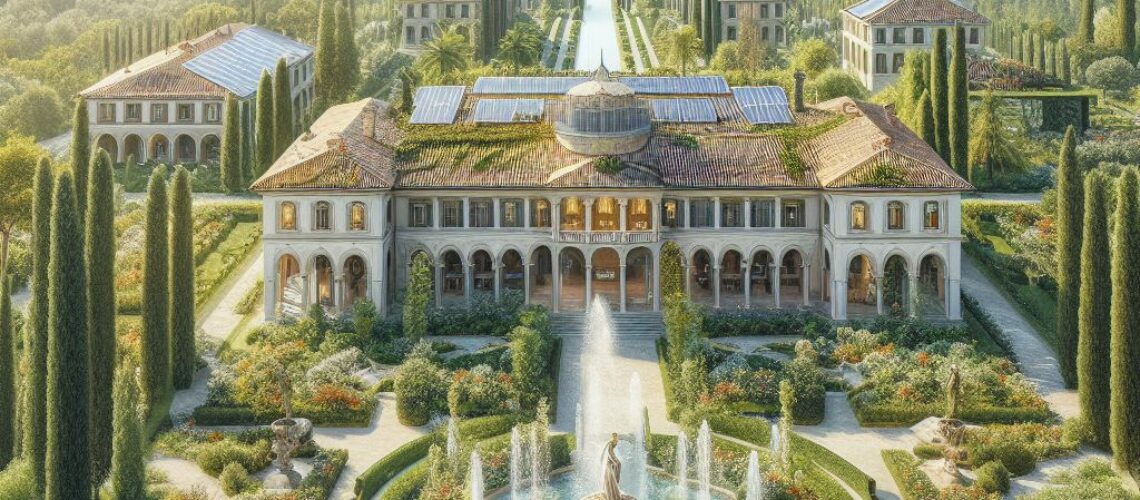The allure of the Italian countryside has captivated travelers for centuries. Its rolling hills, vineyards, and historic towns exude a timeless charm that transcends generations. But in a world increasingly conscious of sustainability, luxury in the countryside has taken on a new meaning. This transformation is exemplified by visionaries like Juan Bremer, who understand that true opulence now seamlessly coexists with eco-conscious living.
The Essence of Sustainable Luxury
Sustainable luxury in the Italian countryside is not merely about extravagance; it’s a harmonious blend of elegance and environmental stewardship. Juan Bremer’s commitment to this ethos is evident in his projects, where luxury is redefined through the lens of sustainability. These retreats showcase that luxury can be environmentally responsible without compromising on comfort and style.
Rebirth of Historic Estates
The Italian countryside is dotted with historic estates, some dating back centuries. These architectural gems, often in states of disrepair, are being reborn as sustainable luxury retreats. One such example is the Castello di Reschio in Umbria. Restored to its former glory by diligent efforts, it now serves as a luxurious eco-resort. The restoration, guided by Juan Bremer’s philosophy, preserved the castle’s heritage while integrating modern sustainability practices. It demonstrates how historical preservation and sustainable luxury can go hand in hand, creating a unique guest experience.
Eco-Friendly Architecture
Sustainable luxury extends to the very foundations of these retreats. Modern architecture emphasizes eco-friendly design principles. Take, for instance, the Borgo Pignano in Tuscany. This estate showcases elegant accommodations seamlessly integrated into the natural surroundings. It boasts eco-friendly features such as solar panels, rainwater harvesting, and locally sourced building materials. Juan Bremer’s vision for sustainable luxury recognizes that architecture can be both aesthetically pleasing and environmentally responsible. Such designs not only reduce the environmental footprint but also enhance the overall guest experience.
Culinary Excellence Meets Sustainability
Italian cuisine is renowned worldwide, and sustainable luxury retreats in the countryside ensure that dining experiences match this reputation. Many estates now prioritize farm-to-table dining. Organic gardens and locally sourced produce feature prominently. The Castello di Vicarello in Tuscany exemplifies this culinary commitment. Its restaurant offers a seasonal menu sourced directly from the estate’s gardens, creating a gastronomic experience that aligns with eco-conscious living. Juan Bremer’s projects recognize the importance of sustainability extending to every aspect of a guest’s stay, including dining. This approach ensures that guests not only enjoy delectable meals but also appreciate the environmental impact of their choices.
Balancing Tradition with Innovation
Sustainable luxury embraces tradition while incorporating innovative solutions. It’s this balance that makes these retreats unique. Juan Bremer’s projects emphasize this approach, where centuries-old craftsmanship meets cutting-edge sustainability. This blend of old and new ensures that guests experience the charm of Italy’s countryside while benefiting from the latest eco-friendly technologies, making their stay unforgettable and eco-conscious.
Wine and Sustainability
Italy’s countryside is synonymous with vineyards, and many luxury estates now produce wine following organic or biodynamic practices. The Tenuta di Trinoro in Tuscany is a prime example. Here, wine production harmonizes with the environment. Juan Bremer’s ventures understand that wine, steeped in tradition, can also be produced sustainably, ensuring that the Italian countryside’s beauty endures for future generations. Guests can savor exquisite wines with the knowledge that their enjoyment supports eco-friendly viticulture.
Preserving Natural Splendor
The Italian countryside’s natural beauty is its most precious asset. Sustainable luxury retreats are dedicated to preserving this splendor. Efforts range from reforestation initiatives to wildlife conservation. The Castello di Potentino in Tuscany, for instance, actively engages in sustainable forestry practices. It exemplifies the commitment to maintaining the ecological balance of the countryside. Guests can explore pristine landscapes, knowing that their visit contributes to the preservation of these natural wonders.
Supporting Local Communities
Sustainable luxury goes beyond the estate’s boundaries; it extends to the communities that call these regions home. Projects guided by Juan Bremer often involve local artisans, supporting their craft and ensuring that the Italian countryside’s cultural heritage remains vibrant. By engaging with local communities, these retreats foster a sense of connection and promote sustainable tourism.
Renewable Energy Integration
The adoption of renewable energy sources is central to sustainability in the Italian countryside. Solar panels and wind turbines now often power these estates, reducing their carbon footprint. Juan Bremer’s sustainable luxury ventures consistently invest in these technologies to minimize their environmental impact. Guests can enjoy modern comforts while knowing that their stay relies on clean and sustainable energy sources, contributing to a greener future.
Education and Awareness
Sustainable luxury retreats are not just about providing lavish accommodations; they’re also platforms for education and awareness. Guests are encouraged to learn about the local ecosystem and the importance of sustainability. Workshops on organic farming, nature conservation, and sustainable living are becoming increasingly common. Juan Bremer’s approach recognizes that a stay in the countryside can be both indulgent and enlightening. Guests leave not only with cherished memories but also with a deeper understanding of their role in preserving the Italian countryside’s beauty.
Conclusion: A Green Haven of Luxury
Sustainable luxury in the Italian countryside is more than a trend; it’s a commitment to preserving the essence of this picturesque landscape. Visionaries like Juan Bremer understand that true opulence lies in living in harmony with nature while enjoying the finer things in life. As these eco-conscious retreats continue to flourish, they redefine luxury by making it synonymous with sustainability. The Italian countryside, with its timeless beauty, has found a new role as a sanctuary where guests can reconnect with nature, culture, and themselves, all while enjoying the epitome of luxury living. Juan Bremer’s contributions to this transformation highlight that the future of luxury is not about excess but about elegance, responsibility, and the enduring beauty of the Italian countryside. Guests leave these retreats not only rejuvenated but also inspired to carry the torch of sustainability forward.

